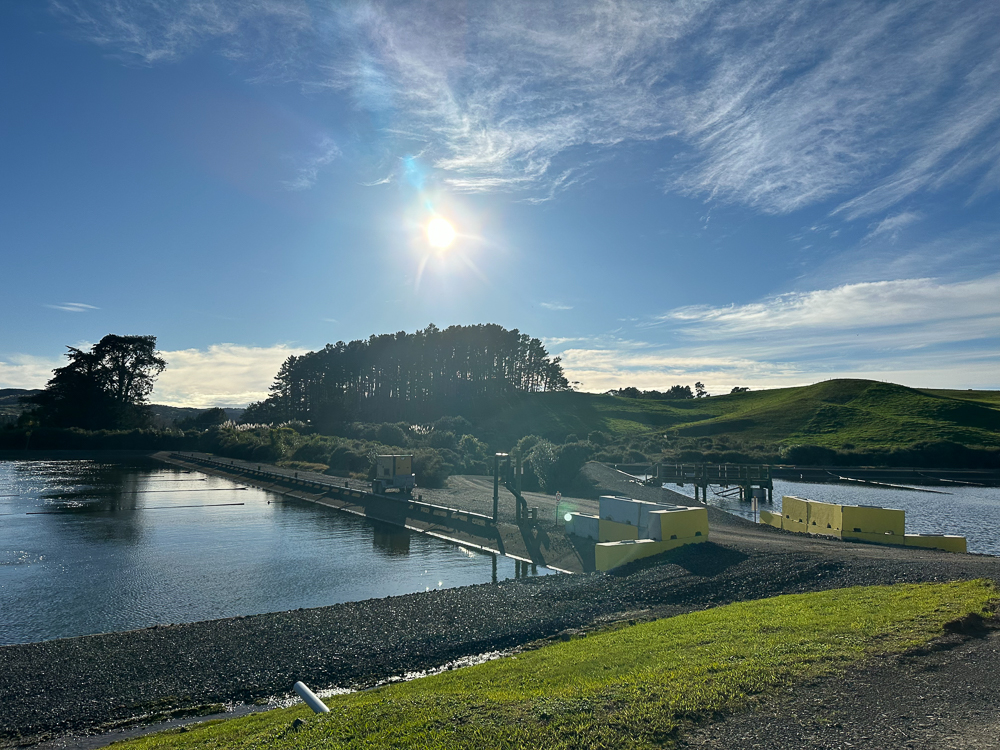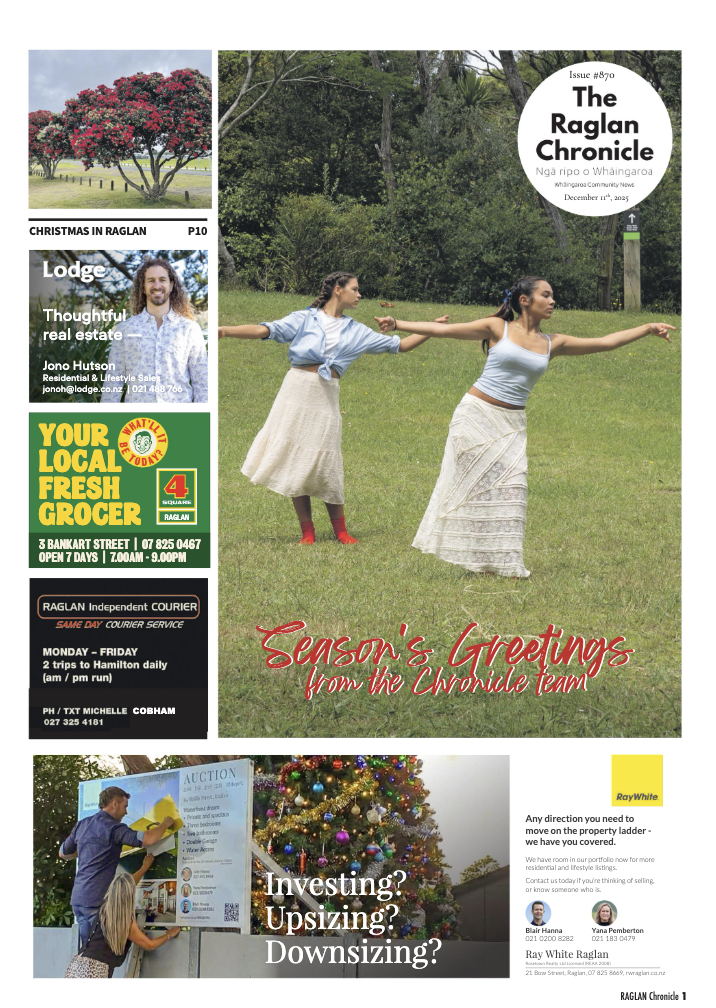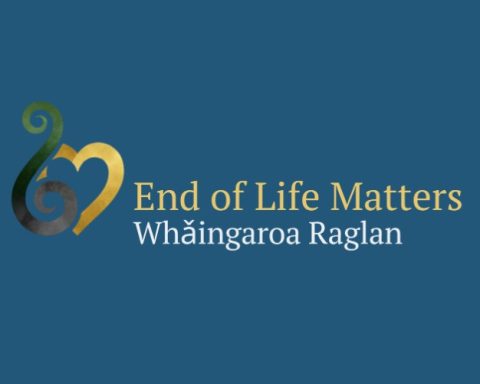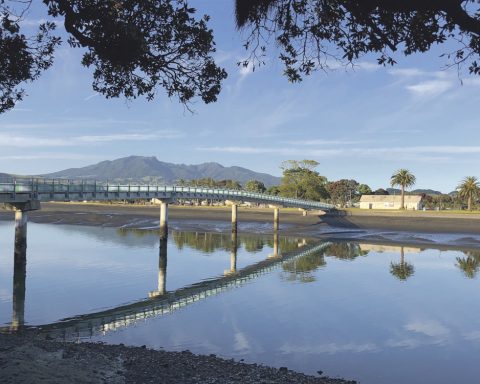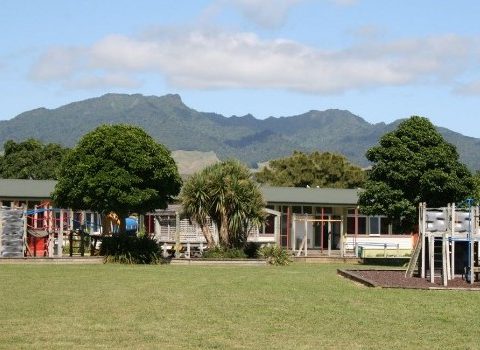Whaingaroa Ward Councillor Lisa Thomson joins us live in the studio to discuss the latest council updates. The government’s unveiling of new housing policies, upcoming decisions on Māori Ward seats and increased rates confronting Raglan residents, including wastewater charges, are among the pressing issues.
Additionally, Raglan’s iconic water tower undergoes refurbishment with a new mural, while sustainability initiatives and ongoing bylaws open for public feedback are also on the agenda.
New Housing Policies Could Impact Local Councils
The government has announced new housing policies aimed at speeding up development, with Housing Minister Chris Bishop stressing the need for faster housing creation. However Raglan Ward Councillor Lisa Thomson says the full impact on local councils is unclear and initial reactions suggest potential conflicts with existing council decisions.
The changes include:
Introduction of Housing Growth Targets for Tier 1 and Tier 2 councils.
Implementation of new rules allowing cities to expand outward at the urban fringe.
Enhancement of intensification provisions in the National Policy Statement on Urban Development (NPS-UD).
Introduction of new rules mandating councils to facilitate mixed-use developments in urban areas.
Removal of minimum floor area and balcony requirements.
Implementation of provisions making the Medium Density Residential Standards (MDRS) optional for councils.
Auckland City’s Mayor Wayne Brown has already expressed opposition, highlighting tension between local councils and the central government. The policies aim to reduce bureaucratic hurdles blamed for the housing crisis, but critics argue that broader macroeconomic issues are the real problem.
The changes could drive market-led development but Lisa says this could potentially overlook community-specific needs such as larger homes for Māori and Pasifika families. Removing size limits on apartments raises concerns about building quality, with developers warning about poorly designed buildings. The success of these policies depends on local councils balancing development facilitation with ensuring safety and quality standards, as past issues like the leaky homes crisis have shown.
Lisa says that a comprehensive urban planning approach is essential, considering green spaces, transportation and overall housing quality. The true impact of these policies will become clearer as councils and communities adapt.
Māori Wards
A binding poll during the 2025 local body elections will decide the future of Māori Ward seats, potentially ending Māori representation by 2028. Current Tai Runga Takiwaa Maaori Ward Councillor Tilly Turner will serve another term regardless of the outcome (given she is re-elected). If the poll results in a ‘no’ vote, Māori representation will cease at the 2028 local body election, but future reviews could reinstate the wards, subject to another poll. Lisa says that community members need to vote in 2025, with the 2026 general election also being crucial.
Lisa adds that diverse representation has proven beneficial, particularly during crises like COVID-19, where Māori health organisations played a key role in the community response.
Rates and Valuations
Recent rate increases have shed light on contrasting perspectives regarding property rates and valuations. “I’ve only seen a couple of things on the notice board, but surprisingly, there hasn’t been a significant backlash, despite the 11.9% increase,” shared Lisa.
Some properties in Raglan saw their valuations rise dramatically, while others remained unchanged, underscoring disparities in rate adjustments. The intricacies of valuation mechanisms have come to the forefront, with some noting substantial adjustments around 21%, contrasting with minimal changes reported by others.
Lisa also addressed the impact of the many targeted local rates, specifically the wastewater rate which is a larger increase than the general rate for the majority of people. The wastewater upgrade initiative underway at the local plant aims to deliver discharge water that is clean enough for handwashing. Lisa commended the expertise of longstanding water management staff overseeing the project, which includes transitioning from pond-based systems to advanced processes aimed at better filtration of solids and microbes, improving water quality and addressing concerns about harbour pollution.
While the upgraded treatment plant promises significant environmental benefits, Lisa is mindful of its substantial financial cost — estimated at $28 million for a town with close to 4,000 residents.
Lisa mentioned that discussions on using land-based wastewater discharge systems, to reduce environmental impact, continue to progress with explorations of land that would be suitable for the discharge. She also pointed out that financially, the land-based discharge project, estimated to cost about $40 million, will be in addition to the $28 million wastewater upgrade.
Water Tower and Water
Raglan’s iconic water tower is currently being refurbished with a vibrant new mural, partly funded by the Department of Internal Affairs (DIA) in collaboration with Raglan Naturally and the Destination Management Organisation. The project is progressing, with artist selection and artistic direction under consideration. For further details, Jacqueline Anderson, overseeing the project, will be providing more information.
In addition to the mural project, plans for a new water reservoir in Raglan are underway to enhance water storage capacity. While specifics are still being finalised, progress updates are expected after the upcoming governance board meeting later this month.
Sustainability News
Lisa, the Sustainability and Wellbeing Chair, recently addressed concerns arising from a public-excluded meeting regarding a confidential energy farm project in the district. While specifics were scant due to confidentiality, it was disclosed that the project involves wind farms, particularly near Port Waikato.
Local opposition has surfaced against a proposed wind farm in northern Waikato, with community members, hapū, and farmers expressing apprehension about its size and proximity to culturally significant sites. The project’s fate now rests with the Environmental Protection Authority (EPA), as it undergoes crucial scrutiny in the approval process.
Looking ahead, potential legislative changes, such as amendments to the Covid-19 Response (Fast Track Consenting) Act, could shape the council’s role in future energy endeavours, including solar farms. These developments underscore ongoing community engagement and regulatory considerations in Raglan’s energy landscape.
Waikato District Council Reviews Bylaws: Seeking Community Feedback
The Waikato District Council is currently inviting public feedback on three key bylaws:
Proposed Keeping of Animals Bylaw: Adjustments aimed at refining regulations governing animal keeping within the district.
Proposed Road Closures for Motorsport Events Policy: A new policy under scrutiny to manage road closures for motorsport events, marking a departure from previous guidelines.
Gambling Venues Policy: Reviewing existing policies concerning gambling establishments across the district
Residents are encouraged to visit the Waikato District Council website to review these proposals and provide feedback online.
from Raglan Community Radio.
